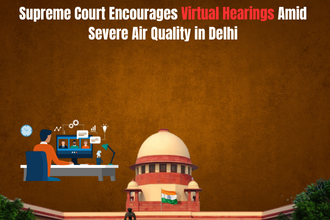New Delhi, August 23, 2025 – In a significant development under the Negotiable Instruments Act, 1881, the Supreme Court has raised serious doubts about whether cheque dishonour cases under Section 138 NI Act can be pursued when the underlying debt arises from an illegal or unenforceable consideration.
The ruling comes in the matter of K.K.D. Pandian v. S. Tamilselvi, where a bench of Justices Aravind Kumar and Joymalya Bagchi heard arguments over the maintainability of proceedings initiated on the basis of a cheque issued to repay a debt considered illegal.
Background: What Section 138 NI Act Says
Section 138 of the NI Act was enacted to instill faith in the banking system and ensure credibility of commercial transactions. The section criminalizes the dishonour of cheques for insufficiency of funds, but it expressly requires that the cheque must be issued for the discharge of a “legally enforceable debt or liability.”
This phrase—legally enforceable debt—is at the heart of the current debate. The question before the Supreme Court is simple but profound:
👉 Can a cheque issued for repaying an illegal or immoral obligation (such as a bribe, fraudulent promise, or transaction forbidden by law) be enforced through Section 138 proceedings?
The Kerala High Court Precedent: C.V. Rajan v. Illikkal Ramesan (2015)
The controversy largely stems from the Kerala High Court’s 2015 judgment in C.V. Rajan v. Illikkal Ramesan.
- Facts of the case: The complainant had paid ₹2.30 lakh to the accused, who promised to secure a clerk’s job in a school. When the promise failed, the accused issued a cheque to return the money. The cheque bounced due to insufficient funds.
- Accused’s defence: Since the money was given for an illegal consideration (securing a job through corrupt means), the liability was not legally enforceable.
- Court’s ruling: The Kerala High Court rejected this defence. It held that once a cheque is issued for repayment, dishonour attracts liability under Section 138—even if the original consideration was tainted. The court reasoned that repayment of money is not prohibited by law, even if the manner in which it was obtained was dubious.
This precedent created a broad interpretation of Section 138, enabling complainants to pursue cheque dishonour remedies even for debts linked with illegal arrangements.
Supreme Court’s Current View in K.K.D. Pandian v. S. Tamilselvi
On August 23, 2025, while hearing the appeal, the Supreme Court made an important prima facie observation:
“The said debt cannot qualify as a legally enforceable debt to bring an action under Section 138 NI Act. The view taken by the Kerala High Court may not be in consonance with the statutory provisions.”
The bench clarified that it was not inclined to issue a blanket notice but would issue notice only to examine the correctness of the Kerala High Court ruling in C.V. Rajan.
This means the Supreme Court is reconsidering whether debts based on illegal consideration can be brought within the scope of Section 138. The matter has been posted for further hearing in six weeks.
Why This Matters: The Legal Significance
1. Narrowing the Scope of Section 138
If the Supreme Court rules that illegal debts cannot qualify, it will firmly limit Section 138 actions to debts that are legally valid. This will prevent misuse of cheque bounce cases in situations involving bribes, fraudulent contracts, or promises violating public policy.
2. Protecting the Sanctity of “Legally Enforceable Debt”
The phrase “legally enforceable” was inserted to exclude transactions forbidden by law. Upholding this interpretation reinforces that Section 138 is not a tool to enforce tainted or corrupt bargains.
3. Consistency with Other Judicial Pronouncements
Courts have previously struck down Section 138 cases where the underlying debt violated statutory provisions.
- Example: The Kerala High Court in July 2025 ruled that cash loans above ₹20,000 violate Section 269SS of the Income Tax Act and cannot be enforced through Section 138.
- Similarly, debts arising out of gambling or money-laundering contracts have been held unenforceable.
The Supreme Court’s present stance aligns with this restrictive approach.
Practical Implications for Litigants and Lawyers
- For Complainants:
Before filing a cheque dishonour complaint, it is critical to examine whether the debt arises from a transaction prohibited by law. If yes, Section 138 may not be maintainable, and complainants may have to explore civil recovery suits or other remedies. - For Accused Persons:
This evolving jurisprudence strengthens the defence that the cheque was issued towards an unenforceable obligation, thus shielding the accused from criminal liability under Section 138. - For Legal Practitioners:
Lawyers must carefully draft complaints and anticipate possible objections regarding the legality of the underlying debt. The case also highlights the importance of citing relevant precedents, including the pending Supreme Court clarification.
Conclusion: Awaiting a Landmark Clarification
The Supreme Court’s decision in K.K.D. Pandian v. S. Tamilselvi could redefine the scope of Section 138 NI Act by drawing a clear boundary between legitimate debts and illegal considerations.
- If the Court overrules C.V. Rajan, cheque bounce cases will be restricted to lawful debts only.
- If it upholds the Kerala High Court view, the scope of Section 138 will remain broader, covering even repayment of debts arising from illegal promises.
For now, the legal community awaits the Supreme Court’s final word, which will not only settle the interpretation of Section 138 but also impact thousands of pending cheque dishonour cases across India.
Also Read
Plea in Supreme Court Challenges BCI’s Three-Year Ban on New Law Colleges


